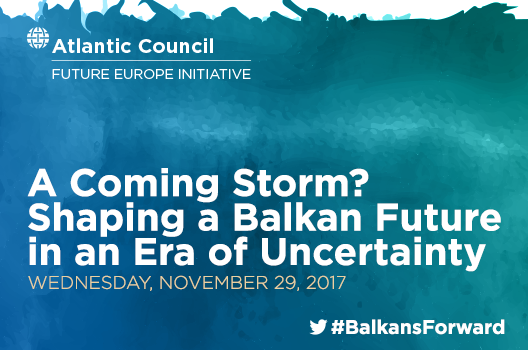Agenda
8:30 a.m. Registration Opens
Light breakfast will be provided
9:00 – 9:30 a.m. Welcoming Remarks and Scene Setter
Welcome: Frederick Kempe, President and CEO, Atlantic Council (confirmed)
Scene Setter:
Damir Marusic, Executive Editor, The American Interest (confirmed)
Damon Wilson, Executive Vice President, Programs and Strategy, Atlantic Council (confirmed)
9:30 – 9:45 a.m. Keynote – The EU Perspective
Mr. Christian Leffler, Deputy Secretary General for Economic and Global Issues, European External Action Service
9:45 – 11:00 a.m. Panel 1 – Shifting Alliances and the Return of Great Power Politics: Managing the New Geostrategic Landscape in Southeast Europe
In recent years, Russia, Turkey, and the Middle East have been perceived to expand their influence in the Balkans. What impact will this have on the region’s Euro-Atlantic aspirations in NATO and the EU? What should the United States and European Union do, if anything, to shape this new strategic landscape?
Dimitar Bechev, Research Fellow, Center for Slavic, Eurasian, and East European Studies, University of North Carolina – Chapel Hill (confirmed)
Molly McKew, President, Fianna Strategies (confirmed)
Molly Montgomery, Special Advisor for Europe and Russia, Office of the Vice President (confirmed)
Moderator: Barbara Surk, Contributing Writer, New York Times (confirmed)
11:00 – 11:15 a.m. Coffee Break
11:15 – 12:45 p.m. Panel 2 – Investing in the Future: Can Entrepreneurs “Fix” the Balkans?
The Western Balkan region has some of the highest unemployment rates and lowest wages in Europe, a situation with well-documented economic and political ramifications. What are the greatest barriers to investment and economic growth, and what can countries do to overcome them? How can the region effectively foster the next generation of entrepreneurs to drive positive economic change moving forward? What role does US and European investment play in the region?
Opening remarks: The Hon. Ron Johnson, US Senator (confirmed)
Mark Boris Andrijanic, Public Policy, Central and Eastern Europe, Uber (confirmed)
H.E. Ivica Dačić, First Deputy Prime Minister and Minister of Foreign Affairs of Serbia (confirmed)
Cyril Muller, Vice President, Europe and Central Asia, The World Bank (confirmed)
H.E. Behgjet Pacolli, First Deputy Prime Minister and Minister of Foreign Affairs of Kosovo (confirmed)
Moderator: Amb. Robert S. Gelbard, Chairman, Gelbard International Consulting (confirmed)
12:45 – 2:00 p.m. Lunch Break
Lunch will be available to all participants
2:00 – 3:15 p.m. Panel 3 – Great Risk, Great Reward: Tackling the Balkans’ Enduring Political Challenges
Despite significant regional progress, a series of political disputes continue to overshadow positive developments. The ongoing dialogue between Belgrade and Pristina over their bilateral relations, the name dispute between Greece and Macedonia, and the internal political turmoil in Bosnia and Herzegovina are all major impediments to the region’s stability. What kind of effort is needed to break through these barriers? How much should the international community be involved?
H.E. Nikola Dimitrov, Minister of Foreign Affairs of Macedonia (confirmed)
H.E. Enver Hoxhaj, Deputy Prime Minister of Kosovo (confirmed)
Astrit Istrefi, Executive Director, The Balkan Forum (confirmed)
The Hon. Hoyt Yee, Deputy Assistant Secretary for European and Eurasian Affairs, US Department of State (confirmed)
Moderator: Janusz Bugajski, Senior Fellow, Center for European Policy Analysis (confirmed)
3:15 – 3:30 p.m. Coffee Break
3:30 – 4:45 p.m. Panel 4 – Going the Distance: The US-EU Partnership in the Balkans and Prospects for Euro-Atlantic Integration
The United States and the European Union have long worked hand-in-hand to drive political and economic reform and encourage stability in the Balkans. As the United States reassesses its foreign policy priorities, and the European Union is forced to address its own internal dynamic, to what extent can/should the US and EU be involved in the region to avoid backsliding and re-incentivize forward progress? What specific steps do EU aspirant countries from the Balkans need to take in the next five years in order to maintain momentum in the accession process?
Opening remarks: The Hon. Jeanne Shaheen, US Senator (confirmed)
Panel: H.E. Ditmir Bushati, Minister of Foreign Affairs of Albania (confirmed)
Rosemary di Carlo, President, National Committee on American Foreign Policy (confirmed)
H.E. Srdjan Darmanović, Minister of Foreign Affairs of Montenegro (confirmed)
Hedvig Morvai, Executive Director, European Fund for the Balkans (confirmed)
Moderator: Katerina Sokou, Washington, DC Correspondent, KATHIMERINI Greek Daily/SKAI TV (confirmed)
4:45 – 6:00 p.m. Panel 5 – NATO in the Balkans: Securing the Frontiers of Europe in Turbulent Times
Over the past decade, NATO’s engagement with the Western Balkan region has increasingly moved from peacekeeping to support for reforms associated with the region’s Euro-Atlantic integration. What is next for NATO in the Balkans? How should NATO’s regional policy evolve over the next 5-10 years, and what specific strategies should the Alliance prioritize to ensure a stable and prosperous region over the long term? How can NATO best play a constructive role in developing Balkan countries’ own capabilities to effectively address the security challenges they face?
Jasmin Mujanović, Fellow, EastWest Institute (confirmed)
Milica Pejanović-Djurišić, former Minister of Defense; Member of the Governance Board, Atlantic Council of Montenegro (confirmed)
Rear Admiral Murray Joe Tynch, III, Assistant Chief of Staff for Operations, Headquarters, Joint Force Command Naples (invited)
Moderator: Amb. Alexander Vershbow, Distinguished Fellow, Brent Scowcroft Center on International Security, Atlantic Council (confirmed)
6:00 – 6:15 p.m. Closing Remarks
6:15 – 7:00 p.m. Reception
Drinks and hors d’oeuvres will be served
